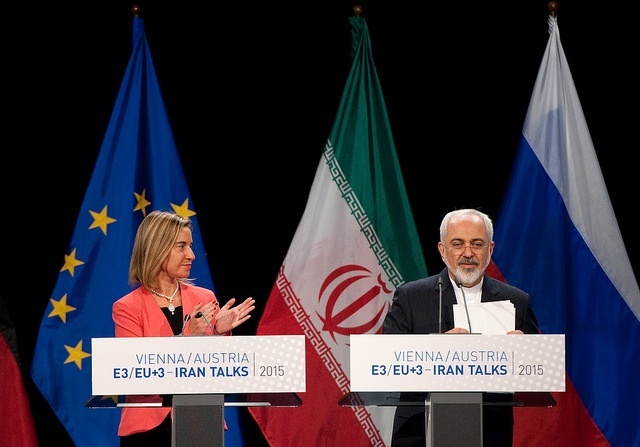The Iran nuclear deal is seen by many as a success for international relations and security. Implementation Day (16th January) came after years of intensive negotiations. Iran has reduced activities that could have been used to develop nuclear weapon capabilities and the E3+3 has responded by lifting many of its sanctions. There remain severe doubts and enemies of the deal in the United States, Iran and neighbouring states. There are likely to be developments in the region that could put the agreement under further pressure.
Is the deal stable?
The deal hinges on a delicate balance between moderates and hardliners in both the United States and Iran. US President Barak Obama claims it as a success of diplomacy, fulfilling commitments to check proliferation he made in his famous “Prague Speech” in 2009. He has faced firm opposition domestically from many Republicans. In turn, Iranian President Hassan Rouhani has attempted to ease the economic sanctions on Iran without appearing to capitulate to the West. He too faced strong pressure from the hardliners in his parliament, the Majles, for giving away too much to the United States.
The level of opposition faced by both leaders has served to emphasise the success of diplomacy it represents. Yet that opposition remains a threat to its success, and trust is in short supply. Incoming Presidents in both countries in 2017 could yet undo the progress made.
There are also reasons for optimism. The initial terms of the Joint Comprehensive Plan of Action (JCPoA) were firm, yet Iran fulfilled them very quickly. Implementation Day was expected later in 2016, so it was a surprise when the International Atomic Energy Agency (IAEA) confirmed Iran had met all requirements by mid-January. The JCPoA has a thorough monitoring system that does not require a continuous physical presence in Iran’s nuclear facilities to ensure adherence to commitments. Finally, the commission responsible for monitoring the JCPoA is chaired by the EU High Representative, likely to safeguard the deal and limit rash actions in terms of restarting nuclear operations or implementing unjustified sanctions.
The longer the deal holds, the stronger it becomes, as trust builds with economic and political relations. This will facilitate reciprocity for future diplomatic endeavours and offer an alternative frame for Iran as one of the world’s antagonists.
The bilateral US-Iranian relationship remains strained by both leaders’ obligation to compensate for the intense domestic opposition. Nonetheless, Iran’s relations with the other E3+3 and EU members are improving rapidly, signalled by promising economic deals. China has signed a major trading deal worth bn with Iran, and will look to help it redesign the Arak nuclear facility. European states, particularly France and Italy, have also recently signed deals.
Regional Opposition
It is the manner in which the deal could allow Iran to grow its diplomatic and financial influence in the region that has sparked speculative concern amongst the region’s other powerful states. Saudi Arabia is concerned with the warming of relations between Iran and the West, and has criticised the impact of the deal in releasing Iranian funds that could be used to continue “nefarious activities” in the region. While the US Secretary of State John Kerry believes Iran will need to prioritise revamping the economy, his reassurance has not satisfied the Saudis. In an interview with CNN the Saudi foreign minister, Adel al-Jubeir, stated that the Kingdom will do what is necessary to protect itself. Following an established Saudi practice of ambiguity, he refused to comment on Saudi’s plans to acquire a nuclear weapon from Pakistan, clearly using such ambiguities as pressure. These concerns are not the only problem for Saudi Arabia. The reintroduction of Iranian oil into the international market will augment existing oversupply, lead to further price drops, and will cause further economic stress for the Kingdom and other Gulf states.
Israeli Prime Minister, Benjamin Netanyahu, remains fiercely opposed to the deal and has pledged that Israel would act as a “watchdog” on any Iranian violations. Israel will continue to develop its offensive and defensive military systems, and its own nuclear weapon capabilities. Officials have sought to maintain ambiguity over dual-capable systems, including the cutting-edge Dolphin class diesel-electric submarines imported from Germany capable of launching nuclear-tipped cruise missiles.
The deal could yet facilitate Iran’s diplomatic involvement in multilateral efforts to stabilise the region’s conflicts, particularly in Syria and Yemen, where Iran has major vested interests. Lines of communication between the US and Iran have clearly improved, illustrated by recent diplomatic incidents.
What can we learn from this non-proliferation success story?
The Iran deal has marked a significant success for global non-proliferation efforts – one of very few in the last five years characterised more by set-back and disappointment. It involves one of the most intensive verification agreements to date. If it holds, and trust develops, it could feed optimism and rejuvenate currently defunct discussions around achieving a Middle East free from weapons of mass destruction, and success in the NPT’s 2020 Review cycle is seemingly dependent upon progress in this area.

